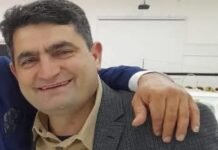
Turkish authorities have failed to release a political prisoner with advanced Parkinson’s disease who has completed his mandatory time in prison, the Bold Medya news website reported.
Bilal Şen, who was sentenced to six years, eight months in prison on trumped-up, terrorism-related charges, completed the legally required four-year prison term as of last week, making him eligible for release on probation according to Turkish legislation on the execution of sentences. However, the authorities are refusing to release him on the grounds that his sentence has not yet been finalized as it has yet not been upheld by the Supreme Court of Appeals.
Şen, 47, was diagnosed with Parkinson’s in 2013, a disease that generally occurs in elderly people. He was arrested on July 29, 2016 following a July 15, 2016 coup attempt in Turkey as part of a massive post-coup purge.
His disease progressed rapidly in a prison in the Central Anatolian city of Kırşehir where he has been incarcerated. “When he was first put into prison, he was able to lead a normal life and take care of his personal needs on his own. Yet, his illness progressed rapidly because he could not get proper medical treatment in prison. It also has a lot to do with his psychological health deteriorating in prison,” his wife says.
Şen now has difficulty walking. “He walks like a toddler. He cannot set his legs in motion, and when he somehow starts walking, he cannot stop himself on his own, making his body go forward and feet lag. He can only take a step by holding on to the walls. His disease also causes low blood pressure, making him prone to falling. He has in fact fallen three times, causing damage to his brain as evidenced by a medical report. The right side of his body has tremors, making him unable to use his right hand. His left side has begun to show similar symptoms. His tongue has tremors as well, disrupting his speech. His mouth contracts inward. His illness has advanced considerably. He now needs to be taken care of like a baby,” his wife states.
He is not fit to stay in prison, according to his wife. “Patients with Parkinson’s are difficult to look after even at home. He needs intense and constant care. He cannot cut his nails, shave or even brush his teeth. His friends were helping him in prison in Kırşehir,” his wife recounts.
He was sent five times to the Istanbul Council of Forensic Medicine for a medical examination to ascertain his fitness to stay in prison. “They issued a report declaring him fit to stay in prison each and every time he was sent there, instead of recommending his release on health grounds. At the first referral, a doctor asked, ‘Does it really matter to you if you’re in prison or out given your illness?’ He was really hurt by that. On one occasion a doctor who had previously examined him said in consternation, ‘Haven’t we released you by now?’”
At his fifth referral one year ago in July 2019, he was transferred to the Metris Rehabilitation Prison in İstanbul where sick inmates are incarcerated. “He is alone in Metris. There is no one to help him there, making his situation psychologically and physically grimmer,” his wife laments.
Arrested on July 29, 2016, Şen was sentenced in September 2018 to six years, eight months in prison over his connections to the faith-based Gülen movement, a dissident group that has long been targeted by President Recep Tayyip Erdoğan.
The court based Şen’s conviction on his alleged connections to Gülenist institutions – membership in a trade union, sending his child to a school and having an account in a bank — all of which, according to the authorities, are pieces of evidence showing his membership in a terrorist organization, a circumstance disputed by international courts and organizations.
A UN body recently found deprivation of liberty on similar grounds to be unlawful and arbitrary, declaring that none of the above-mentioned acts and activities in themselves could be construed as criminal acts, but rather as the peaceful exercise of rights granted under human rights treaties.
President Erdoğan designated the movement as a terrorist organization and declared an all-out war on it making adherence to the movement a crime by association, a process that gained momentum after the abortive coup on July 15, 2016, which President Erdoğan accuses Fethullah Gülen, a US-based cleric and the spiritual leader of the movement, of masterminding despite his categorical denial of any involvement.
As part of the post-coup Gülenist purge, the Turkish government dismissed more than 150,000 civil servants from state jobs and investigated almost 600,000 people, detaining or arresting half of them on terrorism charges.
Şen has spent four years in prison. He became eligible for release on probation last week as set forth by a Turkish law on the execution of sentences. Yet, the authorities refuse to free him on probation because his sentence is pending before the Supreme Court of Appeals.
The Stockholm Center for Freedom has previously documented that Turkish authorities do not release many political prisoners who have served their time on similar grounds.






![[Interview] Beaten, abused and threatened with harm to his family, Turkish teacher recounts harrowing police interrogation amid post-coup purge](https://stockholmcf.org/wp-content/uploads/2025/05/tim-hufner-3R_GnBNRVI0-unsplash-scaled-e1756752490343-218x150.jpg)







